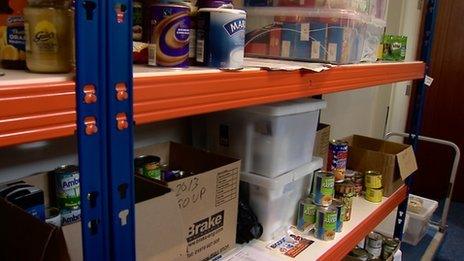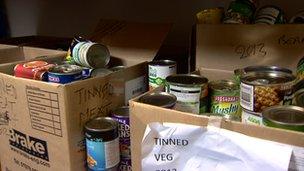Canadian professor says food banks are 'sticking plaster on gaping wounds'
- Published

Professor Power said food banks were not solving the problem of poverty and hunger
Professor Elaine Power, of Queen's University in Ontario, provoked a storm of protest after writing a deliberately controversial article suggesting food banks should be shut down.
She said they were a sticking plaster solution for poverty in Canada. Here she explains why.
Food banks emerged in Canada in the early 1980s as a stopgap, temporary measure to alleviate hunger during an economic downturn.
The good-hearted founders of food banks, who could not fathom that anyone would go hungry in a country as wealthy as Canada, expected that food banks would close their doors once the economy recovered.
Instead, 30 years on, they have become an institutionalised component of our social safety net.
In 2011, approximately 850,000 Canadians (2.5% of the population), received food from about 450 food banks.
Food drives
Thirty-eight percent of food bank recipients were children.
Many Canadians participate regularly in activities to support food banks.
Food bank collection bins are ubiquitous in grocery stores and places of worship, such as churches and synagogues.
Special events, from music concerts to football games, feature donations to the food bank as an entrance fee.
Communities around the country hold food drives, with boy scouts, service clubs, and countless volunteers knocking on citizens' doors asking for donations to stock the food bank shelves.

Food banks run on donations and can only provide the food they have on hand
Politicians exhort voters to donate to their local food banks and social workers regularly refer clients to supplement their social assistance benefits.
I doubt that well-intentioned food bank founders had any idea of what would result from their concern to feed hungry Canadians.
Yet, despite all this activity, approximately 8% of Canadian households were classified as having been hungry in 2007-08.
Only about 1 in 4 hungry Canadians ever even gets to the food bank.
There are likely to be a variety of reasons for this, including lack of a food bank close by, inability to choose the food one receives, and the humiliation of having to go to a food bank.
Some hungry Canadians decide to leave the food for others who they believe need it more than they do.
And even those who do go to the food bank are still hungry.
That is because food banks run on donations and can only provide to their clients the food they have on hand, perhaps supplemented with purchased food (such as eggs and milk).
Food bank hampers usually consist primarily of non-perishable foods; research has found that food banks are seldom able to provide food that meet nutritional recommendations.
Rising demand
Most food banks have restrictions on how often households can use the food bank (usually once a month) and how much food they provide (usually enough for 2-5 days).
Food Banks Canada, the national association representing and supporting food banks across the country, reports that in 2010, 35% of food banks ran out of food and 50% cut back on quantities because of rising demand and inadequate supply.
Food banks have become our primary response to hunger in Canada and Canadians seem to assume that food banks are looking after the problem.
But the problem is too big for food banks — community-based, volunteer-run, donation-driven organisations — to fix.
The existence of food banks, and all the activity we undertake to support them, seems to have squeezed out any space in the public imagination to consider other solutions or the bigger underlying problem of poverty, which causes hunger in the first place.
Food banks are a sticking plaster on the gaping wound of poverty.
And inadvertently, they let our government off the hook from their obligation to ensure that all Canadians have a standard of living that is sufficient for health and well-being.
Elaine Power is associate professor at the School of Kinesiology & Health Studies at Queen's University in Kingston, Ontario.
<link> <caption>BBC Scotland Investigates: Breadline Scotland transmits on Sunday 29 April at 16:32 on BBC Radio Scotland</caption> <url href="http://www.bbc.co.uk/programmes/b01gw2vv" platform="highweb"/> </link>
- Published28 April 2012
- Published28 April 2012